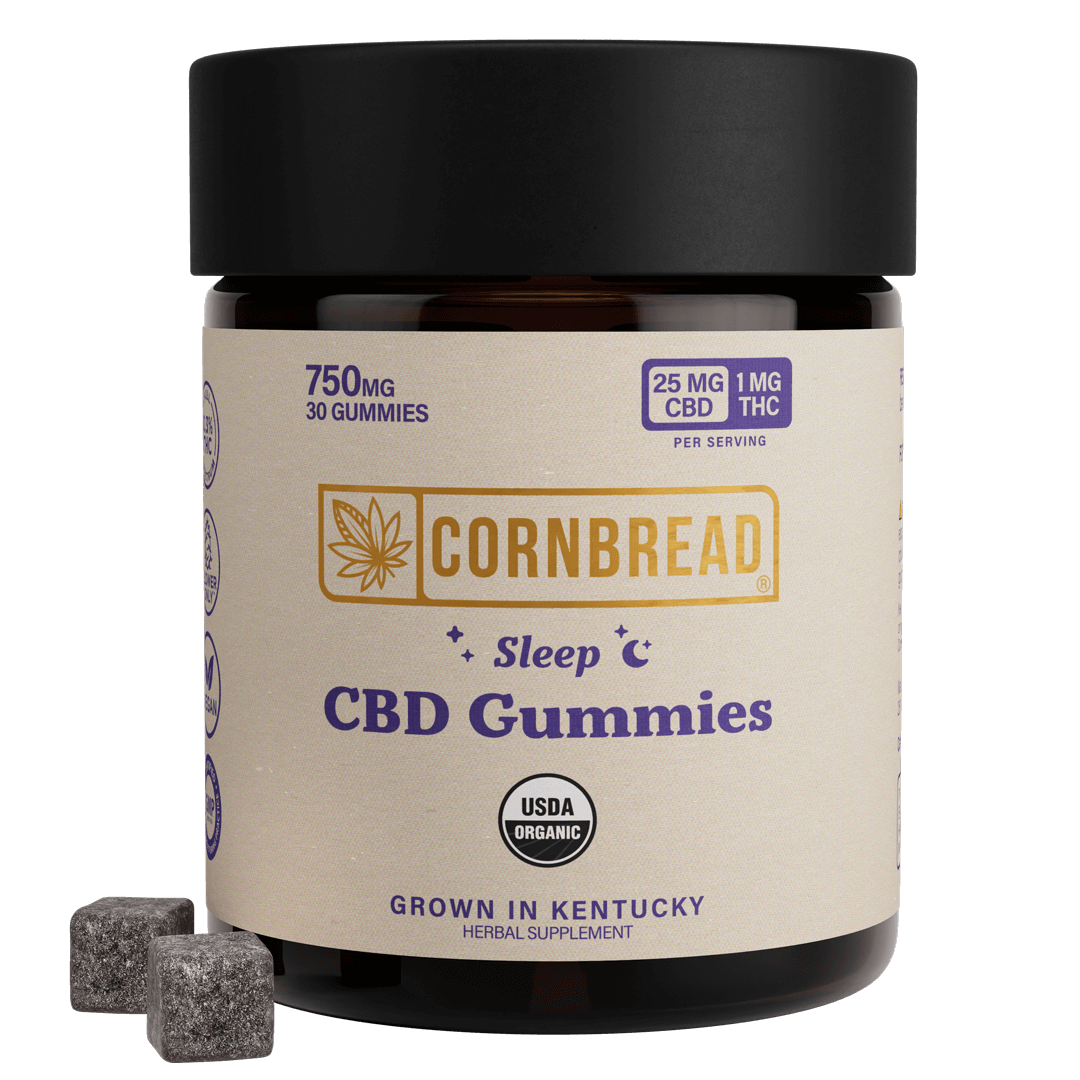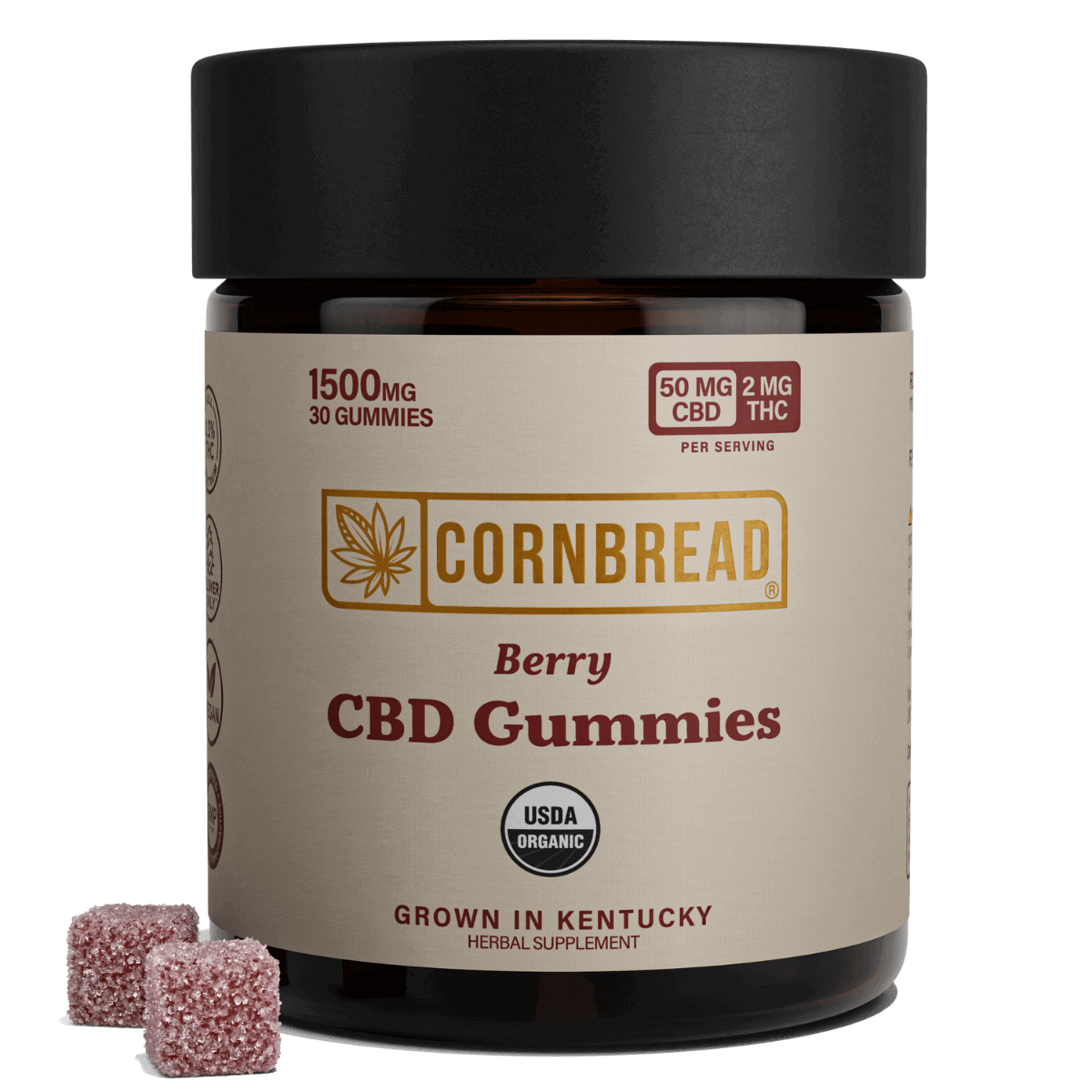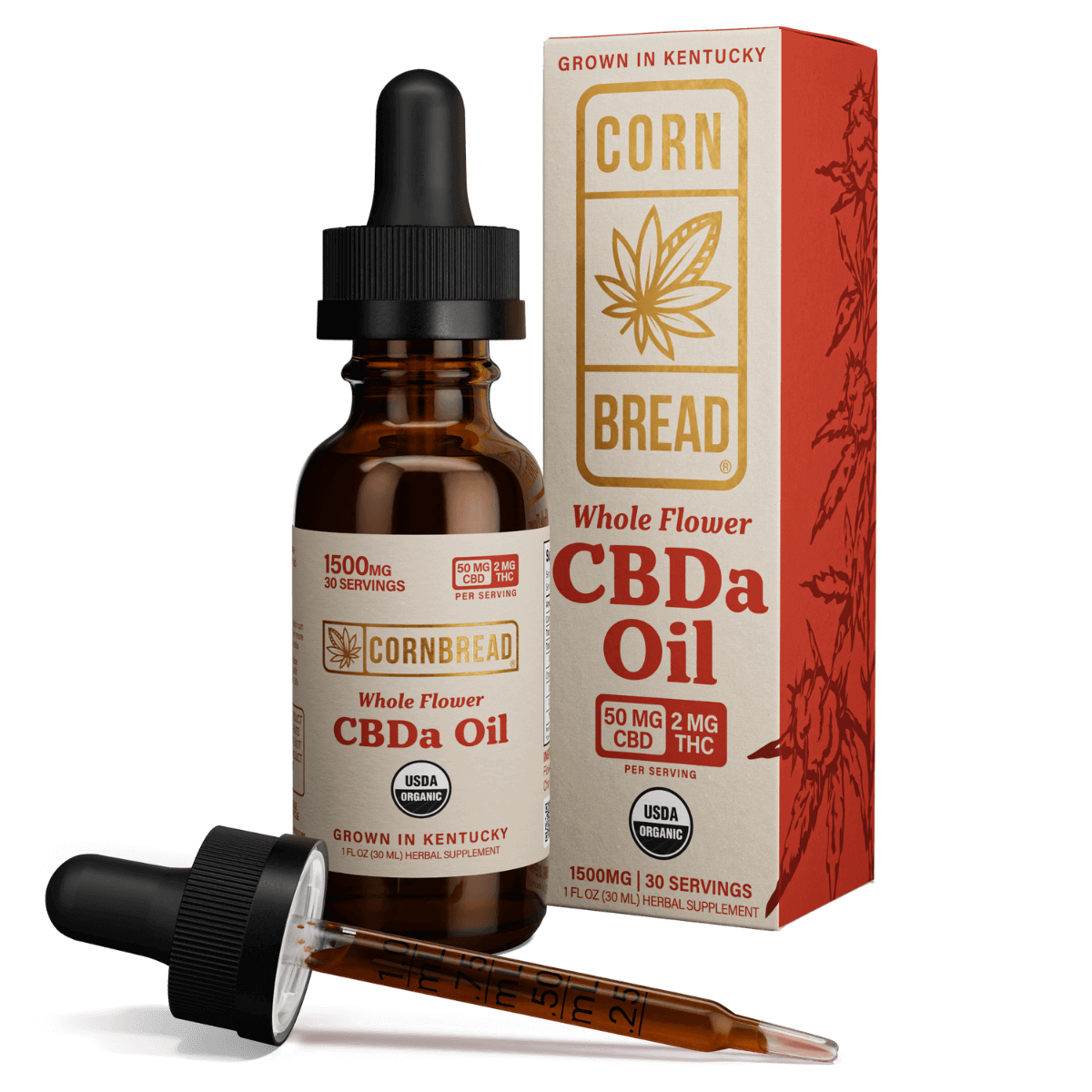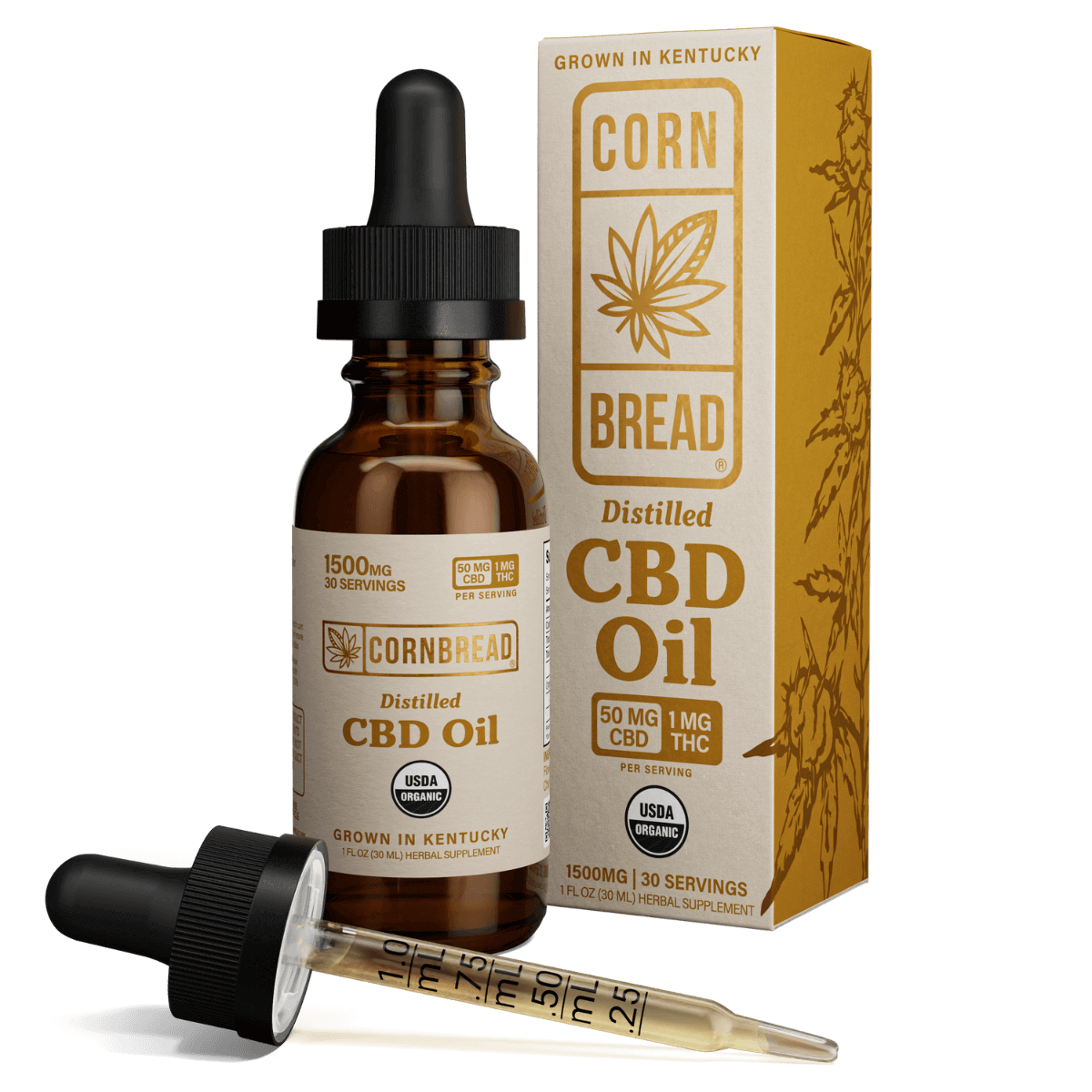Table of Contents
- Introduction
- What Is CBD?
- Allergies 101: What Causes An Allergic Reaction
- How Do You Develop An Allergy?
- Can You Be Allergic to CBD?
- CBD Allergic Reactions vs. Side Effects
- What To Do If You Think You Have a CBD Allergy
- What To Do If You Have a Severe Allergic Reaction to CBD
- Can You Have a CBD Gummy or CBD Oil Allergy?
- Cannabis Allergy: Hemp vs. Marijuana Allergy
- Choose Your CBD Products Wisely
- Organic CBD Supplements From Cornbread Hemp
Introduction
CBD is a special compound used in many wellness supplements and has become a go-to for many seeking natural solutions to stress, sleep troubles, and occasional aches and pains. But for those prone to food sensitivities and seasonal allergies, the question arises, "Can I be allergic to CBD?"
In this article, we'll examine what an allergy is and whether or not a CBD allergy is something you should worry about.
What Is CBD?
The cannabis sativa plant contains special compounds called cannabinoids. There are over a hundred different cannabinoids present in both the hemp and marijuana varieties of cannabis sativa, the two most prevalent being CBD (cannabidiol) and THC (tetrahydrocannabinol).
While these two compounds are closely related, they produce markedly different effects when introduced to the body.

-
THC is known to produce a "high" feeling that may be accompanied by altered perceptions. This is why THC is such a popular recreational substance.
Marijuana contains far more THC than CBD and is typically used medically or recreationally. While more states have begun to legalize this cannabis variety in recent years, it remains a controlled substance in much of the U.S. and on a federal level.

-
CBD, on the other hand, is known to support healthy sleep, improve mood, and provide relief for occasional aches and pains (such as those from exercise-induced inflammation). And it provides all of these health benefits without the mind-bending effects of THC.
In 2018, the hemp variety of cannabis sativa (which contains no more than 0.3% THC) was legalized by the federal government. While some states have placed restrictions on hemp and CBD, the general result was a radical increase in CBD supplements and products introduced to the wellness market.
Allergies 101: What Causes An Allergic Reaction
An allergy is simply an immune response to something which really shouldn't cause an immune response.
When a substance that is typically harmless to most produces a negative response in some, it's deemed an "allergen," and those who experience that negative reaction are said to have an "allergy" to it.
The body identifies pollen, for instance, and decides it's a dangerous thing that must be attacked. Histamines, which play a key role in the body's inflammatory response, are released into the bloodstream and — to put it simply — chaos ensues.
Potential Symptoms of An Allergic Reaction
-
Itchy skin
-
Low blood pressure
-
Flushing (facial redness)
-
Low blood pressure
-
Vasodilation (expanded blood vessels)
-
Airway constriction (this is a really bad one)
-
Pain
-
Nasal congestion
-
Runny nose
-
Sneezing
-
Anaphylaxis (a life-threatening severe immune reaction affecting most of the body)
An allergy may produce mildly annoying reactions (such as congestion), or life-threatening anaphylaxis. It depends on the body's particular sensitivity (or over-sensitivity) to the allergen.2
There are a variety of different allergens that may create an allergic reaction.
Common Types of Allergens
-
Foods such as milk, eggs, fish, shellfish, tree nuts, peanuts, and wheat
-
Airborne substances like pollen, dander, mold, and dust mites, which are commonly associated with seasonal allergies
-
Insect bites or stings as from bees, wasps, and ants
-
Medications like penicillin or aspirin.
-
Latex which can cause an allergic reaction to the skin3
According to the CDC (Centers for Disease Control), about 25% of American adults experience seasonal allergies (e.g., to mold, pollen, etc.), and about 6% have food allergies.4
While 6% doesn't sound like much, that's over 20 million adults with at least one food allergy. Common food allergies in the U.S. include milk, eggs, fish, shellfish, tree nuts, peanuts, and wheat.5
How Do You Develop An Allergy?
Allergies are most common in children and many people with allergies outgrow them in adulthood. Some people, however, may develop a new allergy to an environmental or food allergen as an adult. This can happen over a period of time, or it may seem to come on suddenly. Certain factors — such as stress, hormones, perfumes, or smoke — may play a role in the development of allergies and in the severity of allergic reactions.6
Allergens affect (or don't affect) people in different ways. When a susceptible person encounters an allergen for the first time, their body starts to produce a large quantity of antibodies (specifically immunoglobulin E antibodies) to combat the allergen. The next time they encounter that same allergen, the body is ready to jump into action and they may experience an allergic reaction. Thus, an allergy is born.
In short, it's the exposure to an allergen that results in the development of an allergy. Though most people don't develop allergies, for those that do, it occurs after they've been exposed to allergens.
Can You Be Allergic to CBD?
It's possible to develop an allergy to almost anything, but most allergies involve a protein (and there's a good amount of protein in hemp).7
CBD, which is usually extracted from hemp buds and flowers, is typically well-tolerated by most people. However, it may produce side effects (not allergies) for some individuals, particularly those who take more than the recommended dose. Although even more rare, CBD products could also produce allergic reactions for a very small number of users.
It's unclear if cannabidiol itself is an allergen, but there are other parts of the hemp plant that are known allergens. It's these substances that, more likely than not, would be responsible for any suspected CBD allergy.
Potential Hemp Allergens:
-
Certain proteins
-
Terpenes (compounds responsible for the aroma, flavor, and color of hemp)
-
Hemp seeds (packed full of protein and possibly the most common allergen in hemp)
Other Potential Allergens in CBD Products
There's a wide range of CBD products available on the market — from oils and tinctures to gummies and topical salves — and most of these products don't just contain hemp. They have other ingredients added to improve flavor and texture or to dilute the CBD and make it easier to dose and absorb. Depending on the formulation of a particular product, there may be non-hemp allergens present.
With that in mind, here's a list of some potential allergens sometimes found in CBD products:
-
Carrier Oils: A carrier oil is combined with CBD or hemp extract to create CBD oil. The carrier oil dilutes the CBD, making it easier to dose and easier for the body to absorb. Common CBD carrier oils include coconut oil, olive oil, and hemp seed oil.
Though rare, it is possible to have or develop an allergy to any of these oils. -
Flavorings: Some CBD products (particularly gummies and other edible supplements) may contain artificial or natural flavorings, which could potentially cause an allergic reaction in some people.
-
Additives: Some CBD-infused products contain preservatives, additives, colorings, or stabilizers, which may be allergenic to a small number of people.
-
Gelatin: Gelatin is an animal protein added to some CBD gummies, capsules, or other edible products to improve the texture. Gelatin allergies are rare, but they’ve been reported.
-
Pollen and Plant Proteins: Some CBD products are made with a less refined hemp extract that could contain residual pollen and plant proteins from the cannabis plant. These may cause an allergic reaction for those who are susceptible.
-
Cross-Allergens: If a CBD product contains other ingredients related to known allergens, such as nuts or soy, cross-allergies are a possibility.
-
Pesticides, Heavy Metals, and Other Contaminants: Hemp is a bio-accumulator that readily absorbs contaminants from the soil in which it’s grown. Non-organic hemp can become contaminated with heavy metals, pesticides, mold, and other toxins, all of which have the potential to elicit an allergic response in sensitive individuals.
Because allergic reactions all come from the same basic immune responses, an allergic reaction to an ingredient in a CBD product could range from mild congestion and itchy eyes to a severe allergic reaction called anaphylaxis (swelling of the tongue and throat, difficulty breathing and swallowing, faintness, dizziness, etc.).
CBD Allergic Reactions vs. Side Effects
As discussed earlier, CBD is generally well tolerated. However, it may produce mild side effects for some.
CBD side effects are different from CBD allergies. Side effects don't involve an immune response and are often simply the result of taking too much CBD at once. Side effects (like those listed below) can typically be alleviated by reducing the CBD dose or switching to a higher-quality CBD.
CBD Side Effects
-
Dry Mouth
-
Dizziness
-
Fatigue
-
Diarrhea
-
Change in Appetite
These side effects are rare and appear most commonly in users who take high doses of CBD. Those who take the appropriate recommended dose of CBD are far less likely to experience side effects.
CBD Allergy Symptoms
-
Skin Irritation: Redness, itching, hives, or rashes on the skin
-
Nasal (Nose) Irritation: Runny nose, congestion, sneezing
-
Ocular (Eye) Irritation: Itching, swelling, watering eyes
-
Difficulty Breathing: Shortness of breath or respiratory distress
-
Severe Allergic Reaction (Anaphylaxis): Life-threatening symptoms, including swelling of the tongue or lips, rapid heart rate, and a drop in blood pressure (This severe reaction is most commonly associated with the consumption of hemp seeds.)8
What To Do If You Think You Have a CBD Allergy
Consult with a medical professional before taking CBD if you suspect that you may be allergic. Depending on the severity of your reactions, they may be able to suggest a safer CBD supplement with fewer potential allergens, or they may recommend that you avoid CBD altogether.
What To Do If You Have a Severe Allergic Reaction to CBD
Seek medical care immediately if you experience an allergic reaction to a CBD product, including any of the following symptoms:
-
Hives
-
Life-threatening reactions (anaphylaxis), such as low blood pressure, breathing difficulties, or marked swelling of the tongue or lips
-
Symptoms that affect more than one body system
Can You Have a CBD Gummy or CBD Oil Allergy?

Even if you don't have an allergy to CBD extract itself, it's possible for another ingredient in CBD gummies or CBD oil to produce adverse reactions.
If your allergic reaction to CBD oil wasn't serious, you could switch to an organic CBD oil that doesn't contain potential allergens like mold and pesticides. You could also try a CBD isolate, which contains pure CBD without any other cannabinoids, terpenes, or plant matter. Just keep in mind that CBD isolates aren’t as effective as full spectrum formulas for exactly this reason — they don’t contain the full range of compounds found in the hemp plant, which work together synergistically to produce an enhanced therapeutic effect known as the
“entourage effect.”
Can CBD Gummies Make You Itch?
If you're allergic to an ingredient in a particular type of CBD gummies, it's entirely possible you'll start to itch. Itching is a common response to histamines, which are released in the body during an allergic reaction.
Cannabis Allergy: Hemp vs. Marijuana Allergy
Marijuana and hemp are two types of cannabis sativa. Being allergic to one doesn't necessarily mean you'll be allergic to the other — but it's definitely a possibility. While hemp and marijuana contain the same cannabinoids and many of the same potentially allergenic proteins, the exact amounts of these compounds varies between the two plants.
Cross-reactivity is when proteins in one substance (e.g., marijuana) are similar to proteins in another substance (e.g., hemp) and thus produce a similar allergic reaction. Cross-reactivity doesn't affect everyone, but it does explain why some people who have a marijuana or THC allergy also have a hemp or CBD allergy.
It's not just marijuana and hemp that are involved in cross-reactivity. There are several foods that have similar proteins to cannabis. If you have a CBD or THC allergy (or an allergy to cannabis in general), you may also be allergic to the following foods (and vice versa):
-
Tomatoes
-
Grapefruit
-
Chestnuts
-
Apples
-
Almonds
-
Bananas
-
Eggplant
-
Peaches
-
Hopes
If you have a confirmed (or strongly suspected) marijuana allergy, you should approach CBD with extreme caution and with guidance from your doctor.9
If your doctor deems it safe and you choose to try CBD, be sure to avoid marijuana-derived CBD. While it isn't as common as hemp-derived CBD, it's still out there.
Choose Your CBD Products Wisely

CBD allergies are not common. Most allergic responses to CBD products are more likely due to additives and contaminants than they are to the CBD itself. If you don't have a confirmed (or suspected) CBD allergy, but you want to protect yourself from undue adverse reactions, begin by choosing the right kind of CBD supplement.
Here's what to look for:
-
Made From Organic Hemp: Organic hemp is grown according to strict USDA regulations. CBD extracted from organic hemp won't contain pesticides or other harmful contaminants that non-organic CBD might.
-
Backed By a Certificate Of Analysis: A certificate of analysis (COA) is an official report that shows the results of a product's lab test. The COA should clearly state the exact cannabinoid content and verify the absence of heavy metals, molds, and other contaminants.
-
Third-Party Tested: Many CBD companies utilize lab testing to back up their label claims (CBD content, etc.). However, if the tests aren't performed by a third party, you can't trust them. Make sure that the CBD products you purchase are tested by someone other than the company trying to make a sale.
-
Doesn't Contain Hemp Seed Oil: As mentioned earlier in this article, hemp seeds are probably the most common allergen present in cannabis sativa. CBD products that don't contain hemp seed oil are less likely to create a negative reaction than those that do.
Types of CBD
There are three main types of CBD and each has its own benefits (although there's one clear winner when it comes to efficacy).
-
Full Spectrum CBD contains many of the cannabinoids present in hemp, as well as terpenes and flavonoids (which produce hemp's aroma, flavor, and color). There is also a small amount of THC in full spectrum CBD (no more than 0.3%). As mentioned above, this special combination of cannabis compounds works together synergistically to produce the entourage effect.
-
Broad Spectrum CBD is similar to full spectrum in that it contains many other cannabinoids and compounds. However, the THC has been reduced to undetectable levels. The entourage effect may still be possible with broad spectrum CBD, although it may not be as pronounced as with full spectrum.
-
CBD Isolate is pure CBD with no other cannabis compounds, terpenes, or flavonoids. CBD isolate will not produce the entourage effect, but it still offers the general benefits of CBD (to a lesser extent).
For those who don't have an allergy to CBD, hemp, or marijuana, full spectrum CBD is the best option as it will provide the greatest overall benefits.
Those with an allergy to ingredients or additives other than the CBD itself may find some benefit in a CBD isolate supplement.
Anyone with a known (or suspected) allergy to CBD, should avoid CBD products altogether (unless otherwise directed by a licensed medical doctor).
Organic CBD Supplements From Cornbread Hemp
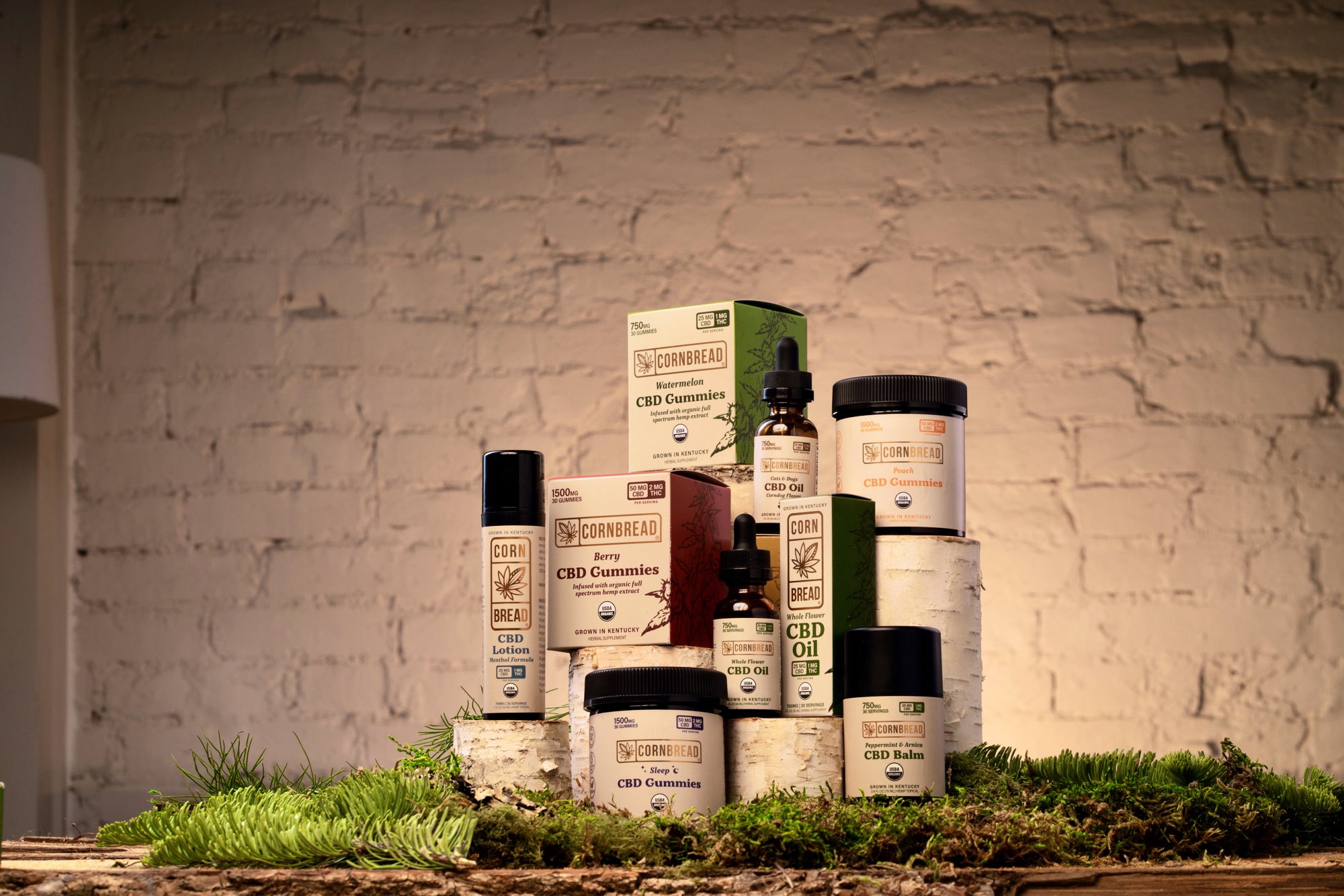
When you're looking for natural solutions, the last thing you need is a supplement that contains harmful additives and allergens.
At Cornbread Hemp, we're dedicated to providing high-quality, pure, and potent cannabidiol products to ensure the greatest health benefits. Our full spectrum CBD supplements are made from Flower-Only™ extract (not from hemp seeds) and are USDA certified organic at every stage.
Instead of hemp seed oil, we use MCT coconut oil as the carrier in our full spectrum CBD oil. Not only does coconut oil improve CBD's bioavailability (absorption rate), but coconut allergies are rare, making our CBD oil a better option for most people.
All of our products undergo third-party lab testing and we make the COAs available online, so you can see exactly what each CBD product contains. Shop now to experience the benefits of full spectrum CBD.













 Log in
Log in












